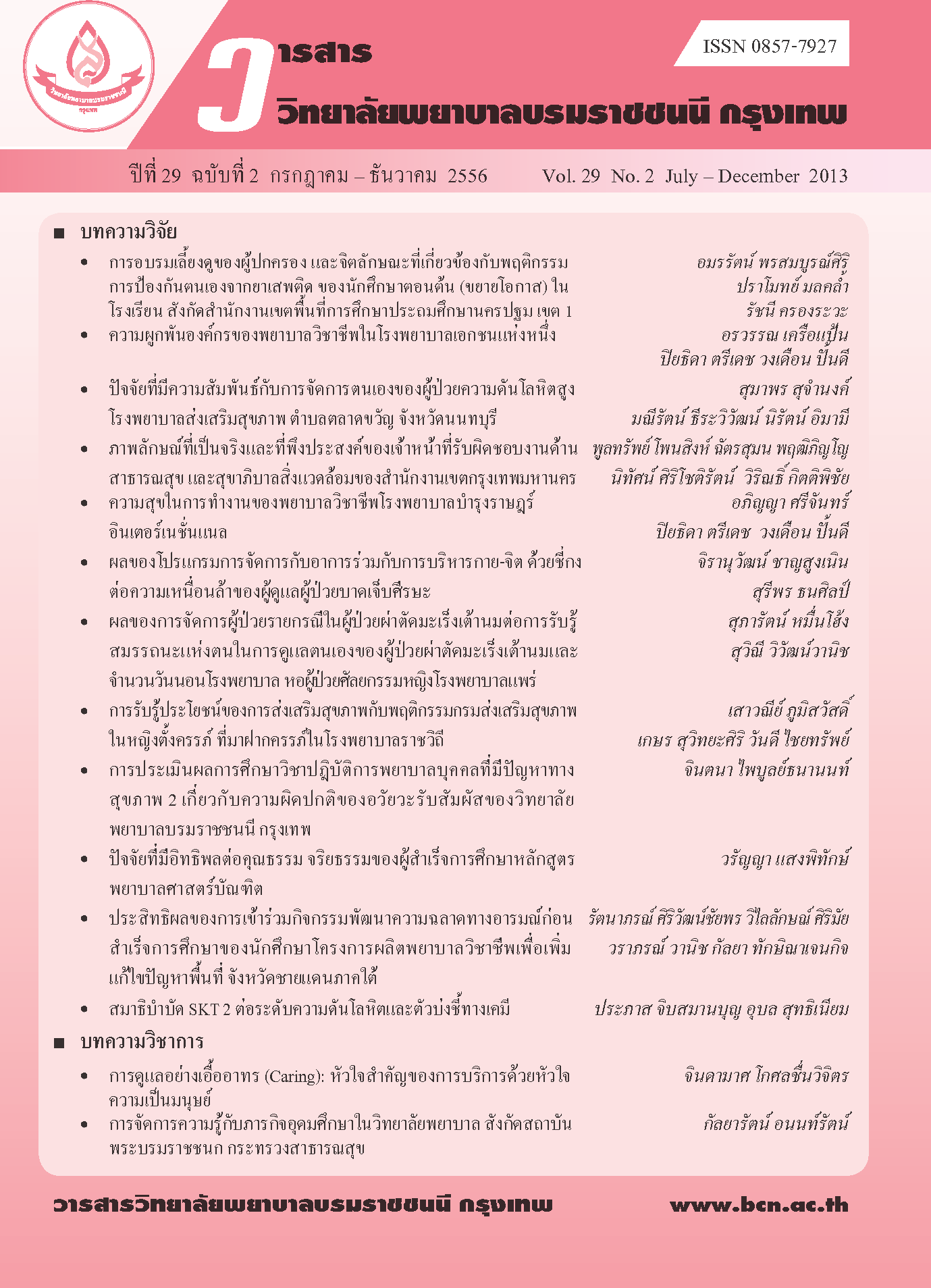ผลของโปรแกรมการจัดการกับอาการร่วมกับการบริหารกาย-จิต ด้วยชี่กง ต่อความเหนื่อยล้าของผู้ดูแลผู้ป่วยบาดเจ็บศีรษะ THE EFFECT OF THE SYMPTOM MANAGEMENT COMBINED WITH QIGONG PROGRAM ON FATIGUE AMONG CAREGIVERSOF HEAD INJURED PATIENTS
คำสำคัญ:
ผู้ดูแลผู้ป่วยบาดเจ็บศีรษะ, ความเหนื่อยล้า, โปรแกรมการจัดการกับอาการร่วมกับ การบริหารกาย-จิตด้วยชี่กง, caregivers of head injured patients, fatigue, symptom management combined with Qigong programบทคัดย่อ
บทคัดย่อ
การวิจัยครั้งนี้เป็นการวิจัยกึ่งทดลอง มีวัตถุประสงค์เพื่อเปรียบเทียบผลของโปรแกรมการจัดการกับอาการร่วมกับการบริหารกาย-จิตด้วยชี่กงต่อความเหนื่อยล้าของผู้ดูแลผู้ป่วยบาดเจ็บศีรษะ กลุ่มตัวอย่างคือ ผู้ดูแลผู้ป่วยบาดเจ็บศีรษะที่เข้ารับการรักษาในโรงพยาบาลศูนย์ตรัง ซึ่งมีคุณสมบัติตามเกณฑ์ที่กำหนด จำนวน 40 คน เป็นกลุ่มควบคุม 20 คน กลุ่มทดลอง 20 คน โดยคำนึงถึงความคล้ายคลึงกันในเรื่องของ อายุของผู้ดูแลต่างกันไม่เกิน 5 ปี เพศของผู้ดูแล และระดับความพิการของผู้ป่วยบาดเจ็บศีรษะอยู่ในระดับเดียวกัน กลุ่มควบคุมได้รับการพยาบาลตามปกติ กลุ่มทดลองได้รับโปรแกรมการจัดการกับอาการร่วมกับการบริหารกาย-จิตด้วยชี่กงและการพยาบาลปกติ ซึ่งโปรแกรมนี้ผู้วิจัยได้พัฒนาขึ้นจาก แบบจำลองการจัดการกับอาการของ Dodd และคณะ (2001) และแนวคิดการบริหารกาย-จิตด้วยชี่กง ประกอบด้วย 4 ขั้นตอนคือ 1) การประเมินความต้องการและประสบการณ์การรับรู้ของผู้ดูแลผู้ป่วยบาดเจ็บศีรษะ2) การพัฒนาศักยภาพในการจัดการกับอาการ 3) การจัดการอาการด้วยตนเองที่บ้านและ 4) การประเมินผลเครื่องมือที่ใช้ในการเก็บรวบรวมข้อมูล ได้แก่ แบบสอบถามข้อมูลส่วนบุคคลของผู้ดูแลผู้ป่วยบาดเจ็บศีรษะ แบบประเมินความเหนื่อยล้าของผู้ดูแลผู้ป่วยบาดเจ็บศีรษะซึ่งมีค่าความเที่ยงสัมประสิทธิ์อัลฟาของครอนบาค เท่ากับ .95 วิเคราะห์ข้อมูลโดยการแจกแจงความถี่ (frequency) หาค่าร้อยละ (percentage) และสถิติทดสอบที (Independent t-test)
ผลการวิจัยสรุปได้ดังนี้
ค่าคะแนนความเหนื่อยล้าของกลุ่มทดลองหลังได้รับโปรแกรมฯ 2 สัปดาห์และ 4 สัปดาห์ น้อยกว่ากลุ่มควบคุมอย่างมีนัยสำคัญทางสถิติ (t = 6.52, p < .05 และ t = 19.42, p < .05 ตามลำดับ)
ABSTRACT
The purpose of this quasi experimental research was to compare the effect of the symptom management combined with Qigong program on fatigue among caregivers of head injured patients who were admitted to Trang Hospital that was 40 qualified cases. 20 cases were the control group, 20 cases were the experiment group by considering to similarity on the caregiver’s age not differed 5 years, the gender of the caregivers and the disability level of the head injury patients were in the same level. The control group received routine nursing care. The experimental group derived the symptom management combined with Qigong practice program and the usual treatment which the program that the researcher developed from the symptom management model Dodd et al (2001) and the symptom management combined with Qigong practice program concept consisted of 4 stages namely 1) symptom experience assessment, 2) the potential development on the symptom management, 3) self-management at home and 4) evaluation. The instruments were demographic data sheet and fatigue questionnaire. The fatigue questionnaire was tested for reliability with Cronbach’s alpha coefficient of .95. Data were analyzed using descriptive statistics and inferential statistics.
The research result concluded as follow:
The fatigue score of the experiment group after the program for 2 weeks and 4 weeks less than the control group with the statistically significance (t = 6.52, p < .05 and t = 19.42, p < .05respectively).
Downloads
ดาวน์โหลด
เผยแพร่แล้ว
รูปแบบการอ้างอิง
ฉบับ
ประเภทบทความ
สัญญาอนุญาต
บทความที่ได้รับการตีพิมพ์ เป็นลิขสิทธิ์ของวารสารวิจัยสุขภาพและการพยาบาล (วิทยาลัยพยาบาลบรมราชชนนี กรุงเทพ) ไม่สามารถนำไปตีพิมพ์ซ้ำในวารสารฉบับอื่น


















